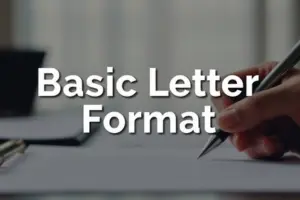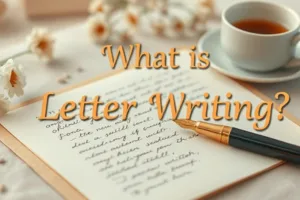What is an Inquiry Letter – Types, Format, and Writing Guide for Beginners
Published: 15 Dec 2024
Inquiry letters are a key tool in effective communication, allowing individuals to request information about specific topics, products, services, or opportunities. These letters serve as formal requests for clarification or details, often used in professional and personal settings. For example, a potential client may inquire about a company’s services, or a student might seek details about university admission procedures.
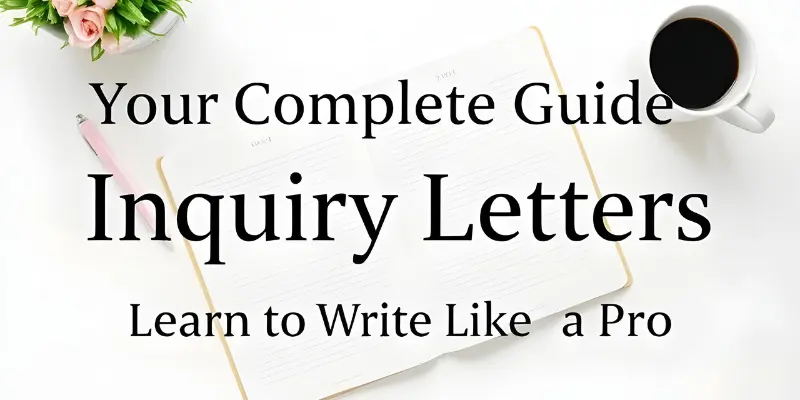
A well-written inquiry letter reflects professionalism and ensures that your questions are conveyed clearly and respectfully. It is a powerful method to make informed decisions, establish connections, or gather vital information. With the right tone, format, and structure, an inquiry letter can open doors to valuable responses.
This guide is tailored for beginners and professionals alike. By the end, you’ll not only understand what an inquiry letter is but also how to craft one like an expert. Along the way, we’ll explore types of inquiry letters, their structure, dos and don’ts, and practical tips to make your letters stand out.
Let’s begin your journey to writing effective inquiry letters today!
1. What is an Inquiry Letter?
An inquiry letter is a formal written request for information, clarification, or details about a specific product, service, event, or opportunity. It is often used in professional and academic settings, enabling individuals or businesses to gather essential data to make informed decisions. Whether you’re a potential customer asking about a product’s specifications, a job seeker inquiring about a position, or a student seeking admission details, an inquiry letter helps establish clear and respectful communication.
Inquiry letters are versatile and widely used. They can address diverse purposes, such as requesting price quotations from suppliers, learning about eligibility for academic programs, or following up on previous communication. This type of letter typically maintains a polite and professional tone while ensuring that the request is clear and concise.
In summary, inquiry letters act as a bridge between the sender and recipient, enabling seamless communication and helping resolve queries efficiently. A well-crafted inquiry letter demonstrates professionalism, saves time, and improves the chances of receiving a prompt and accurate response.
2. Importance of Inquiry Letters
A well-crafted inquiry letter is more than just a tool for seeking information—it’s a gateway to building meaningful professional connections and ensuring effective communication. Over the years, I’ve seen how these letters can streamline processes and open up new opportunities, whether for a job seeker, a business owner, or a student. They play a vital role in gathering clarity and establishing rapport in various professional and academic contexts.
Here’s why inquiry letters matter:
- Demonstrate Professionalism: A polite and clear inquiry letter reflects respect and professionalism, leaving a lasting impression on the recipient. For instance, a well-written inquiry can prompt quicker and more favorable responses.
- Facilitate Informed Decisions: Whether you’re exploring a new business opportunity or selecting a course, inquiry letters help gather accurate details that empower better decision-making.
- Save Time and Effort: Structured letters eliminate confusion and minimize back-and-forth communication by directly addressing specific questions and concerns.
- Build Relationships: Inquiry letters often act as the first point of contact, setting the tone for a strong professional relationship. Clear, respectful communication fosters trust and encourages collaboration.
- Ensure Clarity in Communication: By presenting your questions precisely, inquiry letters reduce misunderstandings and increase the likelihood of receiving an accurate and prompt response.
Whether you’re a job seeker looking for information about a company or a student exploring academic options, writing an effective inquiry letter ensures that your efforts are professional, concise, and impactful. These letters not only help you get the information you need but also leave a positive impression on the recipient, paving the way for productive outcomes.
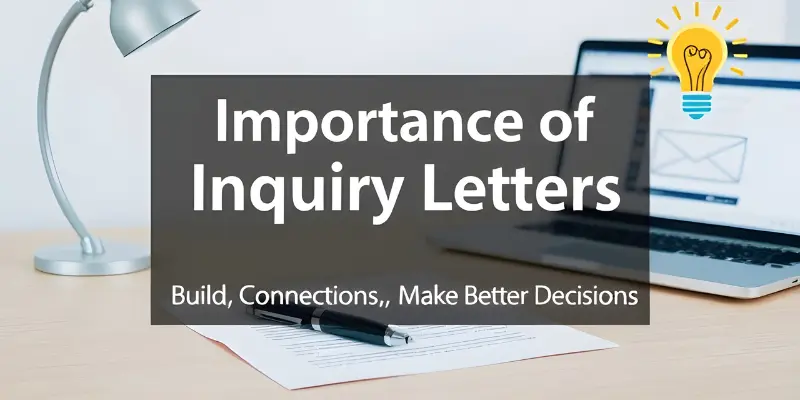
3. Types of Inquiry Letters
Inquiry letters are written for various purposes, and knowing their types can help you communicate more effectively. With my experience in communication and letter writing, I’ve observed how choosing the right type of letter can lead to faster and more meaningful responses. Here are some types of inquiry letters explained simply:
1. General Inquiry Letter
Used to ask for general information about a product, service, or organization.
Example: “Can you provide an overview of your services?”
2. Sales Inquiry Letter
For inquiring about pricing, discounts, or product specifications.
Example: “Do you offer volume discounts for large orders?”
3. Job Inquiry Letter
Sent to explore job openings or learn about the application process.
Example: “Are there any upcoming vacancies in your department?”
4. Academic Inquiry Letter
To gather information about admissions, courses, or scholarships.
Example: “What are the eligibility criteria for the scholarship program?”
5. Follow-Up Inquiry Letter
Written to follow up on a previous request or communication.
Example: “I’m following up on my earlier email about the workshop registration.”
6. Product Inquiry Letter
Focused on asking about specific product features, compatibility, or warranties.
Example: “Does this product come with free installation support?”
7. Business Inquiry Letter
For exploring potential partnerships or collaborations between businesses.
Example: “Would your team be interested in a joint marketing initiative?”
8. Complaint Inquiry Letter
To seek clarification or resolution for a grievance.
Example: “What is the process for replacing a defective item I received?”
9. Event Inquiry Letter
To learn about event details like schedules, registration, or fees.
Example: “Could you confirm the timings for the keynote session?”
10. Financial Inquiry Letter
Used to inquire about payment plans, fees, or loan options.
Example: “What are the repayment terms for your personal loans?”
11. Service Inquiry Letter
To ask about the availability or quality of services offered.
Example: “Do you offer same-day shipping for urgent orders?”
12. Governmental Inquiry Letter
To request information or clarification from a government office.
Example: “What are the steps for applying for a small business permit?”
13. Vendor Inquiry Letter
For requesting proposals, quotations, or details about goods and services.
Example: “Can you share a price list for your office furniture catalog?”
14. Real Estate Inquiry Letter
To ask about property details like pricing, availability, or terms.
Example: “Is the listed property still available for purchase?”
15. Health and Insurance Inquiry Letter
For seeking information about healthcare or insurance policies.
Example: “Does this health plan cover routine check-ups?
Why Understanding Types Is Essential
Each type of inquiry letter serves a distinct purpose. For example, a sales inquiry letter is ideal for learning about bulk discounts, while a complaint inquiry letter ensures your concerns are addressed promptly. Tailoring your letter to the right type improves your chances of getting a clear and timely response.
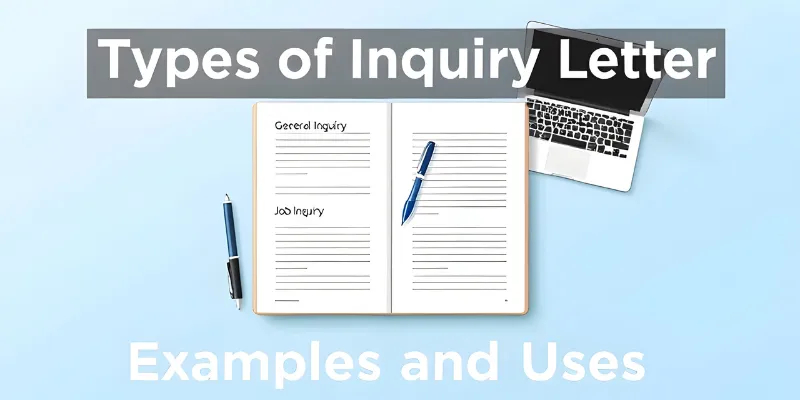
4. General Structure of an Inquiry Letter
Writing a clear and professional inquiry letter starts with understanding its basic structure. A well-organized letter not only makes your request easy to understand but also increases the chances of receiving a prompt and accurate response. Below is the general structure of an inquiry letter, broken into simple steps:
1. Sender’s Information
Begin with your full name, address, email, and phone number at the top of the letter (left or right, depending on the format). This ensures the recipient knows how to contact you.
Example:
Rajesh Kumar
Flat No. 45, Green Heights Apartments
Banjara Hills, Hyderabad – 500034
rajesh.kumar@email.com | +91 9876543210
2. Date
Add the date just below your contact details. This helps both parties keep track of correspondence.
3. Recipient’s Information
Include the recipient’s full name, title, organization, and address. Ensure this information is accurate to direct your letter to the right person.
Example:
Ms. Priya Sharma
Manager, Customer Support
XYZ Pvt. Ltd.
Sector 62, Noida – 201301
4. Subject Line (Optional)
For formal emails, include a subject line summarizing the purpose of the letter.
Example: Subject: Inquiry About Product Specifications
5. Salutation
Address the recipient respectfully using “Dear [Title] [Last Name]” (e.g., Dear Mr. Sharma or Dear Ms. Priya). If unsure of the recipient’s name, use a general greeting like “Dear Sir/Madam.”
6. Introduction
Start with a brief introduction explaining who you are and the purpose of your letter. Be polite and get straight to the point.
Example:
“My name is Rajesh Kumar, and I am writing to inquire about the features and pricing of your latest software solution.”
7. Body (Main Inquiry)
Clearly state your questions or requests. Use bullet points or a numbered list if you have multiple questions, making it easier for the recipient to respond. Be concise and avoid unnecessary details.
Example:
“I would appreciate it if you could provide details on the following:
- Compatibility with Windows and macOS.
- Pricing for bulk licenses.
- Availability of technical support services.”
8. Closing Paragraph
Thank the recipient for their time and express your expectation of a response. You can also mention how and when you prefer to be contacted.
Example:
“Thank you for your time and assistance. I look forward to hearing from you soon. Please feel free to reach me at my email or phone number mentioned above.”
9. Closing Phrase and Signature
End with a professional closing phrase such as “Sincerely” or “Best Regards,” followed by your full name. If sending a printed letter, leave space for your handwritten signature above your typed name.
Example:
Sincerely,
Rajesh Kumar
Why Structure Matters
A properly structured inquiry letter ensures your message is understood without confusion. It also leaves a positive impression, showing that you are professional and well-prepared. In my experience, a well-organized letter often results in faster and more thorough responses.
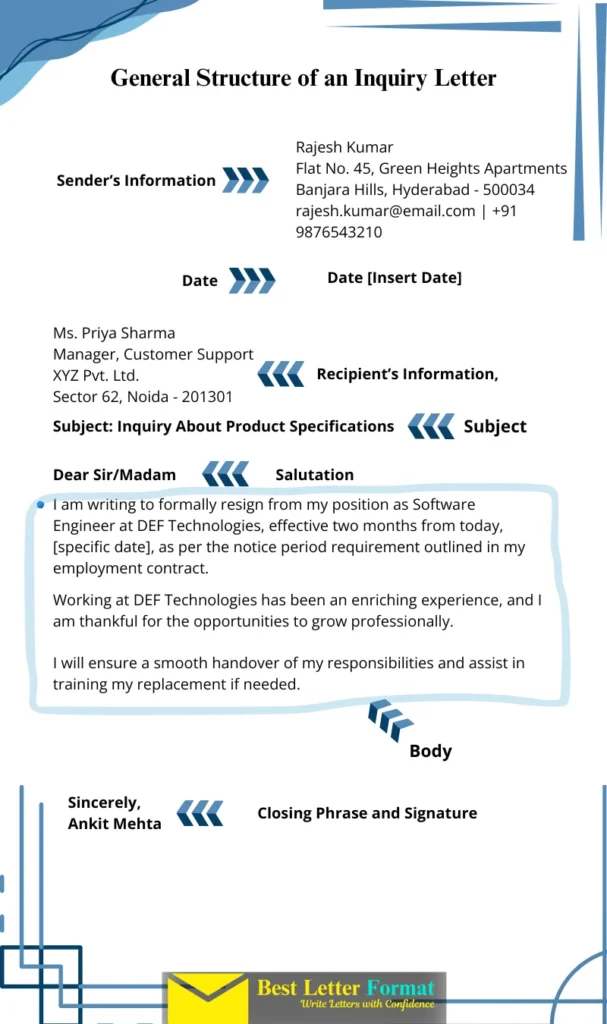
5. General Inquiry Letter Template for Any Inquiry
This format is versatile and works for all types of inquiry letters, whether for products, services, academic information, job opportunities, or general details.
[Your Name]
[Your Address]
[City, State, ZIP Code]
[Your Email Address]
[Your Phone Number]
Date: [DD/MM/YYYY]
[Recipient’s Name]
[Recipient’s Title]
[Company/Organization Name]
[Recipient’s Address]
[City, State, ZIP Code]
Subject: [Brief and Specific Purpose of the Inquiry]
Dear [Recipient’s Title and Last Name],
I hope this message finds you well. My name is [Your Name], and I am writing to inquire about [briefly state the purpose of the letter]. I am keen to learn more about [mention the subject or context, e.g., a service, program, policy, etc.].
Could you kindly provide further details on the following:
- [First point of inquiry or question]
- [Second point of inquiry or question]
- [Additional points, if applicable]
If there are any documents, brochures, or links available, I would greatly appreciate it if you could share those as well.
Please feel free to contact me at [your phone number] or [your email address] if you require any clarification regarding my inquiry. I look forward to your response at your earliest convenience.
Thank you for your time and consideration.
Sincerely,
[Your Full Name]
[Handwritten Signature for Printed Letters]
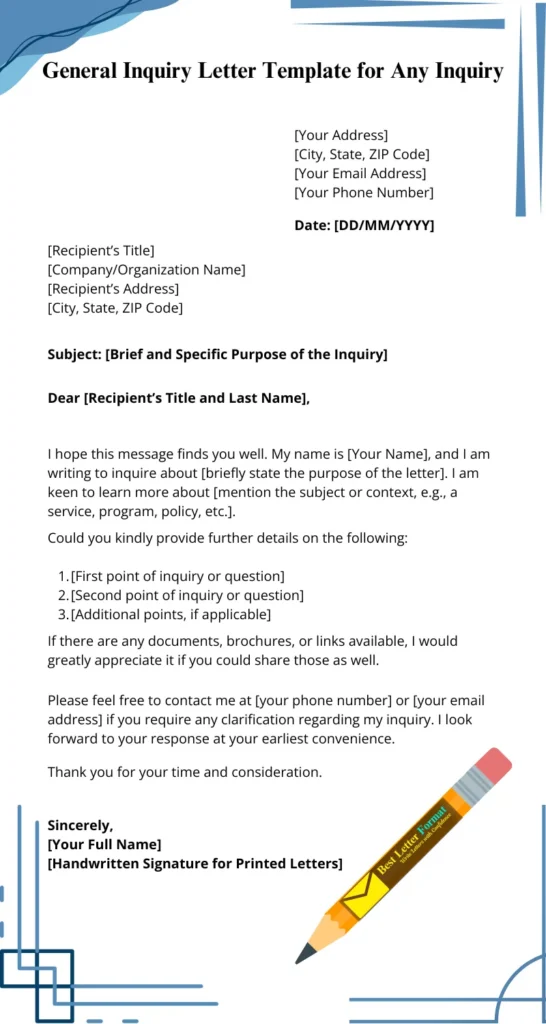
6. Tips for Writing an Effective Inquiry Letter
As we’ve seen in the previous section, the structure of an inquiry letter lays the foundation for clear communication. However, a well-structured letter alone isn’t enough. To ensure your inquiry gets the desired response, you need to follow these essential tips. These practices not only enhance the professionalism of your letter but also make it easier for the recipient to address your questions promptly.
Here are some essential tips to make your inquiry letter professional and effective:
- Be Specific About Your Questions: Clearly state what information you need to avoid confusion.
Example: Instead of writing “Tell me about your services,” write “Can you provide details on delivery options and return policies?” - Use a Professional Yet Polite Tone: Respectful language creates a positive impression. Avoid being too casual or demanding.
Example: Use “I would appreciate it if you could…” instead of “I want you to…” - Proofread for Errors: Double-check your letter for grammar or spelling mistakes. An error-free letter reflects professionalism.
- Use Short, Focused Paragraphs: Keep paragraphs concise, addressing one idea or question at a time. This improves readability.
- Add a Subject Line (For Emails): Use a brief subject line that summarizes the purpose of your inquiry.
Example: Subject: Inquiry About Course Admission Details - Express Gratitude: Always thank the recipient for their time and assistance, even before receiving a response.
- Provide Clear Contact Information: Ensure your email or phone number is included so the recipient can respond easily.
7. When to Use an Inquiry Letter
Now that we’ve explored tips for writing an effective inquiry letter, let’s focus on situations where using one is essential. Inquiry letters are incredibly versatile and can be used in various professional, academic, and personal contexts to gather specific information or seek clarity. Here are some common scenarios where inquiry letters prove useful:
- Before Making a Purchase:
To ask about pricing, product features, or availability.
Example: Requesting bulk pricing for office supplies. - Event or Program Details:
To get information on schedules, venues, or fees.
Example: Asking about a workshop’s agenda. - Academic Queries:
To inquire about admissions, courses, or scholarships.
Example: Asking a university about scholarship deadlines. - Job Opportunities:
To explore job openings or application processes.
Example: Writing to a company about unlisted vacancies. - Business Information:
To learn about services, terms, or partnerships.
Example: Inquiring about collaboration opportunities with a vendor. - Financial Clarifications:
To ask about payment plans, loans, or account statements.
Example: Requesting repayment terms for a personal loan. - Resolving Complaints:
To seek clarification on refunds, grievances, or replacement policies.
Example: Asking customer service about returning a defective product. - Exploring Real Estate Options:
To gather details about properties, pricing, or legalities.
Example: Inquiring about a property’s price and amenities. - Government Services:
To request official guidelines or permits.
Example: Asking about the process to register a small business. - Insurance Policies:
To understand coverage or claim processes.
Example: Writing to an insurer about health policy coverage.
Why It’s Important
Understanding when to use an inquiry letter ensures that your communication is purposeful and effective. For instance, using one before making a purchase helps you avoid unnecessary expenses while using one for job-related inquiries can open doors to new opportunities. In my experience, the most successful inquiry letters are those sent at the right time with a clear purpose.

8. Dos: Best Practices for Writing an Inquiry Letter
- Be Polite and Professional: Maintain a respectful tone throughout your letter.
Example: Use phrases like “I would appreciate it if you could…” instead of “I need you to…” - Start With a Clear Subject Line or Purpose: Open with a precise statement of why you are writing.
Example: “Subject: Inquiry About Admission Deadlines for MBA Program” - Use Bullet Points for Multiple Questions: Organize your questions in a list to make them easy to read.
Example:
“Could you provide information on:- Course duration
- Fee structure
- Application deadlines?”
- Proofread for Spelling and Grammar: Errors in your letter can appear unprofessional and reduce credibility.
Tip: Always read your letter aloud or use grammar tools to double-check. - Provide Accurate Contact Details: Make it easy for the recipient to reply by including your phone number, email, and address.
- Follow Up Politely: If you don’t hear back within a reasonable timeframe, send a polite follow-up.
Example: “I wanted to follow up on my earlier email regarding the pricing details.”
Don’ts: Mistakes to Avoid
- Don’t Be Vague in Your Questions: Ambiguous queries can confuse the recipient and delay responses.
Example: Instead of “Tell me about your services,” ask, “Can you provide details about your delivery timelines and return policies?” - Avoid Using Slang or Casual Language: Formal letters require professional language.
Example: Use “Please share the information I requested” instead of “Hey, can u send the details?” - Don’t Write Long, Unfocused Letters: Keep your letter concise and to the point.
Tip: Aim for 3-4 short paragraphs or a single page. - Avoid Demanding Immediate Responses: Request politely without pressuring the recipient.
Example: “I look forward to hearing from you at your earliest convenience.” - Double-check Details: Ensure the recipient’s name, title, and address are correct before sending the letter.
- Don’t Send to the Wrong Person or Department: Research beforehand to ensure your letter reaches the appropriate recipient.
FAQs About Inquiry Letters
Here are some common frequently asked questions about inquiry letters to help you understand their purpose and writing process better:
An inquiry letter is a formal request for specific information, such as details about a product, service, or opportunity. It is important because it helps establish clear communication and ensures you get the exact information needed.
Begin with your contact details, followed by the recipient’s information, a clear subject line (if applicable), and a respectful salutation. In the introduction, briefly state the purpose of the letter.
The body should clearly outline your questions or requests, preferably in a logical sequence or bullet points. Each query should be specific to avoid confusion.
An inquiry letter should be concise, ideally not exceeding one page. Focus on essential questions or information to keep the letter easy to read and respond to.
Yes, but ensure the topics are related and presented in an organized manner. Use bullet points or separate paragraphs for each topic to maintain clarity.
Use general salutations such as “Dear Sir/Madam” or “To Whom It May Concern.” Avoid guessing or assuming names, as this can come across as unprofessional.
The tone should be polite, professional, and respectful. Avoid casual language, but ensure the letter remains approachable and not overly formal.
Wait for 7-10 business days, then send a polite follow-up letter or email, reiterating your questions and attaching the original correspondence if needed.
The best format includes your contact details, a clear subject line, an introduction, a well-organized body, and a polite closing with a request for a timely response.
Avoid vague questions, grammatical errors, excessively long letters, casual tone, and forgetting to include accurate contact information.
Conclusion
Inquiry letters are a powerful and versatile tool for professional and personal communication. From requesting specific information to building meaningful connections, these letters play a vital role in helping individuals and businesses achieve clarity and make informed decisions. Throughout this guide, we’ve explored everything from the definition and importance of inquiry letters to their types, structure, dos and don’ts, and frequently asked questions.
- Inquiry letters help establish professional communication and gather essential details.
- A clear structure, polite tone, and concise content are critical for effectiveness.
- Avoid common mistakes like vague questions, overly casual language, or sending to the wrong recipient.
- Use bullet points for clarity and follow up politely if you don’t get a response.
Now it’s your turn! Use the insights and examples shared in this guide to craft professional inquiry letters with confidence. Whether it’s for a business proposal, academic opportunity, or personal request, remember that a well-written inquiry letter can open doors to valuable opportunities.
Have you written an inquiry letter recently? Share your experiences or challenges in the comments below. Your input could inspire and guide others in their communication journey!

- Be Respectful
- Stay Relevant
- Stay Positive
- True Feedback
- Encourage Discussion
- Avoid Spamming
- No Fake News
- Don't Copy-Paste
- No Personal Attacks

- Be Respectful
- Stay Relevant
- Stay Positive
- True Feedback
- Encourage Discussion
- Avoid Spamming
- No Fake News
- Don't Copy-Paste
- No Personal Attacks



